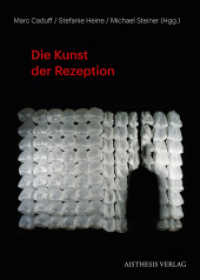- ホーム
- > 洋書
- > 英文書
- > Computer / General
Full Description
The sixteen-volume set, CCIS 2282-2297, constitutes the refereed proceedings of the 31st International Conference on Neural Information Processing, ICONIP 2024, held in Auckland, New Zealand, in December 2024.
The 472 regular papers presented in this proceedings set were carefully reviewed and selected from 1301 submissions.








